Mary Kingswood's Blog, page 6
October 28, 2024
Review: An Improper Correspondence by Jayne Davis (2024)
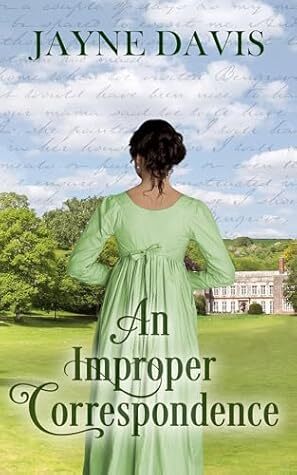 Another incomparable book from Jayne Davis, an author who always seems to come up with a unique look at the Regency era, without ever stepping outside the bounds of proper behaviour.
Another incomparable book from Jayne Davis, an author who always seems to come up with a unique look at the Regency era, without ever stepping outside the bounds of proper behaviour.
Here’s the premise: Joanna Stretton isn’t looking for love, filling her days with caring for her sick mama and helping her papa, rather secretly, with his investment projects. But when she meets handsome and charming Captain Alfred Bengrove, the younger son of a viscount, she can’t resist. He’s only visiting for a week before returning to his regiment in Spain, but he asks Jo to wait for him to return from the war, and she agrees. It’s not a betrothal, but it is a commitment, of sorts. But his family assume it’s a definite betrothal, and then comes the devastating news that Alfred is missing in action.
Happily, he’s only injured and captured by the French, but it’s his writing hand that’s out of action, so he ropes in a fellow captured officer, Captain Robert Delafield, to write his letters home, including those to Joanna. And even when Alfred is well enough to write his own letters, somehow Rob finds a reason to continue to write to Joanna. A most improper correspondence!
And so the stage is set. The reader sees the worst of Alfred, during his time as a prisoner of war in France, and understands that he’s only chasing after Jo for her dowry and the inheritance from her father (she’s an only child and he’s very rich). His obnoxious and snobby family make it obvious, too. And Rob, of course, the hero, is everything that a hero should be – honourable, kind, thoughtful, intelligent and poor. Wait, what? But that doesn’t matter, since she’s so rich… and no, this is not that book, that founders because she’s rich and he’s poor. The only question is how long it will take Jo to switch allegiance once the prisoners return to England. Spoiler: not very long at all. In fact, it all seemed a bit sudden to me. Not the part about wanting to dump the obnoxious Alfred, but the speed with which Jo decided she wanted to marry Rob. But it was a wonderful moment, so let it stand.
If I have a quibble at all (and it’s a minor one), it’s that Jo’s mother, who’s the daughter of an earl, chooses not to use her courtesy title. She could be Lady Frances Stretton after her marriage, but she chooses to be Mrs Stretton, which of course is entirely her right. But given that she’s so conscious of rank, and so keen for Jo to move in the ‘higher society’ of the aristocracy, it seems an odd choice. And then it’s confusing for those who don’t know her. I’m a great believer in everyone being aware of the exact rank of everyone else (or how else is one to know the precise depth to which one is expected to curtsy?). I’ve read several books where the hero introduces himself as simply {Name} and he’s assumed to be Mr Name, when he’s really the Earl of Name (or similar). It’s misleading and potentially embarrassing.
Now in this case, it does lead to some glorious set-downs, such as when the obnoxious Alfred’s even more obnoxious mother patronisingly asks Jo how she would address the daughter of an earl, and she perkily replies, “The one I know, I call Mama.” Which is lovely, but I still think the obnoxious mother ought to be told this sort of thing upfront. And later, when she (a mere viscountess) says she outranks Mrs (or Lady Frances) Stretton, she’s plain wrong. They both have the rank of a viscountess. A daughter of the aristocracy married to a commoner retains her birth rank from her father, leading to the non-intuitive result that of two sisters, both daughters of earls, the one married to a commoner outranks her sister married to a baron, who takes her rank solely from her husband. But that’s a huge digression, and not really relevant.
In summary, another wonderful five-star read from the author. Highly recommended.
Review: The Other Bennet Sister by Janice Hadlow (2020)
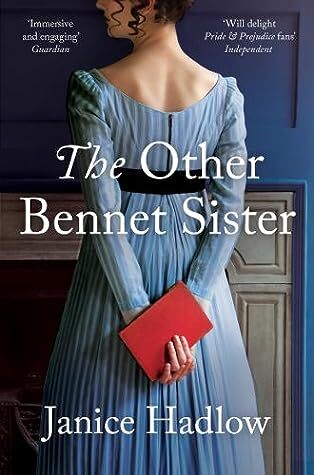 Well, that was a slog, and no mistake. 673 pages, according to Amazon, and I felt every single one of them. And the worst of it is that nothing happens for most of them, it’s just Mary agonising about about herself, life and everything. There’s a little burst of action right at the end, but really, it was too little, too late.
Well, that was a slog, and no mistake. 673 pages, according to Amazon, and I felt every single one of them. And the worst of it is that nothing happens for most of them, it’s just Mary agonising about about herself, life and everything. There’s a little burst of action right at the end, but really, it was too little, too late.
Here’s the premise: the book looks at possibly the least loved of the Bennet sisters, bookish, sanctimonious prig Mary. The best of the book is found in the early chapters, where Mary’s happy childhood gradually descends into self-loathing as she realises that she is the plain one of the family, and therefore the least valued and least likely to marry well, if at all. Her father has retreated to his study, avoiding his family as much as possible, and her mother, whose sole ambition is to see all her daughters married, is relentlessly negative towards Mary. The other sisters fall into neat pairs, excluding Mary. Only Mrs Hill, the housekeeper, of all people, seems to take an interest in her.
There is one other person who seems to understand Mary’s situation, and that is Charlotte Lucas. Apart from the difference in age (almost ten years, by my calculation), this is a very natural pairing, since Charlotte is also plain and unvalued, and likely to end a spinster. She has the conversation which in P&P she had with Elizabeth, about the need to seize even the smallest opportunity of an advantageous marriage, with Mary instead. Mary takes her advice to heart, and sets out to entice Mr Collins away from his fixation with Elizabeth to herself. She feels (and the reader must surely agree) that she would have made a much better wife for him than Elizabeth, but her mother is discouraging, and in the end Mary fails even to attract his notice, while Charlotte manages to scoop him up from under everyone’s nose.
This part of the book, which intersects with the origin at many points, I found quite tedious. The repetition of key points of the original adds nothing to this book (that was Elizabeth’s story, after all, and to some extent Jane’s and Lydia’s, so the whole of it could have been dropped altogether or passed over relatively quickly. Instead, the lengthy extra passages (so much introspection!) slowed the pace down almost to a halt.
The next section was pretty dull too. Mr Bennet dies (a common strategy in JAFF), the Collinses move into Longbourn and Mary and her mother are homeless (Kitty has conveniently married a clergyman). At first they settle with the Bingleys, where Mary’s mother is quite happy, but Mary, constantly under her mother’s eye, isn’t. Then she tries the Darcys but finds herself very much the outsider in the close knit family grouping of Darcy, Elizabeth and Georgiana. So next she tries the Collinses and Longbourn, and here is where the book comes slightly off the rails.
Initially, Charlotte and Mr Collins are very much as in the book. Charlotte manages the household (and her husband!) with a sure eye, keeping him happy but out of her hair as much as possible. Mr Collins seems contented enough, but Mary thinks he’s a little sad. Because she’s still bookish and still trying to ‘improve’ herself, she sets about Mr Collins’ library and ropes him in to her reading program, to advise and guide and instruct her, just as she tried before, when she hoped to marry him herself. But this time, Mr Collins responds, and lo and behold, he turns out to be something of an intellectual, smart, thoughtful, intelligent and even self-aware. So not like Mr Collins at all, who would never have been able to see the ridiculousness of his own buffoonery. But here he actually reflects on it to Mary, and talks about his marriage. And Charlotte even becomes jealous of his growing closeness to Mary! As if!
So Mary makes a final leap to Gracechurch Street and the Gardiners, and this is where, at long last, the book actually starts to develop something resembling a plot. Mary has a makeover, which happily just smartens her up a bit without making her a raging beauty, and then there are two suitors on the scene competing for Mary’s hand, the long postponed trip to the Lakes finally takes place, and things actually happen (hallelujah!). None of it is terribly surprising, but after chapter upon chapter of gloomy introspection from Mary, this is just a breath of fresh air. I wasn’t much impressed with the final resolution of the romance, because it could have put the man in a very difficult position if he hadn’t felt the same way, but at least Mary showed some gumption.
This is a hard book for me to review because, although in many ways it’s well written, for most of it I just didn’t enjoy it. I kept going in the hope that it would finally get some momentum, and it did, right at the end, but it was really too late to save it. I didn’t notice many historical errors, although I cringed every time Mary went off walking the streets of London by herself, or entertaining one of the suitors alone. I think if the book had been reduced to a sensible length, or if its excess of pages had been filled with actual events rather than Mary’s inner thoughts and low self-esteem, I might at least have given it three stars. Frankly, the author is too good a writer to put out this turgid stuff, and she has a major publisher who should have done some serious editing on it, so no excuse. Two stars it is. But if you want the every-last-detail version of Mary’s life, or you really, really like endless introspection and analysis of books of the era, then this is definitely the book for you.
Review: The Undaunted by Kate Archer (2022)
 The third part of this series, and the routine is well established now. An unlikely debutante is chosen to make her entrance to society under the aegis of one of six ladies who had no daughter of their own. Said debutante gets into a multitude of trouble, falls out with the hero (a relative of the sponsoring lady) who then rescues her from even worse trouble and a happy ending hoves into view.
The third part of this series, and the routine is well established now. An unlikely debutante is chosen to make her entrance to society under the aegis of one of six ladies who had no daughter of their own. Said debutante gets into a multitude of trouble, falls out with the hero (a relative of the sponsoring lady) who then rescues her from even worse trouble and a happy ending hoves into view.In this episode, the young lady is Miss Caroline Upton, daughter of a baron more interested in his stud and horseracing, and she finds herself sponsored by Lady Easton because Lord Easton (and the Prince Regent, no less) incurred a gambling debt. There’s the usual business about getting the girl kitted out for society, and then they’re off to Brighton, since the main season is over. Here, Caroline is unwittingly drawn into the Prince Regent’s rackety set, in peril of her reputation, while Lady Easton and her cronies set about keeping her respectable.
As always with this author, the humour is well to the fore, with Lady Easton and her nephew both incredibly buttoned up and driven by routine, a butler who’s just as much a stickler and a lady’s maid who’s delightfully subversive, and the cause of Caroline getting into trouble on multiple occasions. The joy of this book is seeing the nephew, Lord Bertridge, gradually unravelling as he becomes reluctantly embroiled in Caroline’s affairs.
It’s all jolly good fun, and if there is a certain slackness in historical accuracy, who cares? It’s so much fun, I can’t give it less than five stars.
October 14, 2024
Review: The Bride’s Seduction by Louise Allen (2006/2024)
 A fine read – why have I never come across this author before? There’s a lot of sex in it, but it’s appropriate for the story and the characters.
A fine read – why have I never come across this author before? There’s a lot of sex in it, but it’s appropriate for the story and the characters.
Here’s the premise: Marina Winslow is the old maid of her family, at twenty-six, but when Justin Ransome, the Earl of Mortenhoe, calls on her brother to agree terms to buy his family’s old home from him, Marina finds herself unexpectedly on the receiving end of a very determined courtship. The reader is under no illusions about the reason for this. Marina’s brother, Charlie, wants to sell the house to Justin for as high a price as he can get, but he also wants to marry off the spinster of the family. So the deal is money and marriage, or no house. Marina can’t resist the charming, handsome Justin, so married they are and off to Knightshaye, gambled away by Justin’s father to Charlie’s father some twenty odd years ago, and now restored to its original owners.
But the house and the entire estate has been let go to rack and ruin, the tenants are surly and suspicious and the servants are new and unsure of themselves. It’s quite a challenge for the newlyweds, and Marina now knows the truth of her whirlwind courtship, let slip by her stupid brother. How can she ever trust Justin, knowing how easily and glibly he deceived her? The two tiptoe round each other, trying to find an accommodation, Justin hating the secret he’s promised not to reveal to Marina, and she coming to terms with what looks like betrayal, which includes a seeming lie regarding an old flame of Justin’s who married someone else. It’s made even harder for her by their rampantly enjoyable sex life, and the inconvenient fact that she’s fallen in love with her husband.
So there are rows and apologies and the usual, just like real life. Eventually, things come to a head, and the old flame’s machinations push Marina over the edge and she does something pretty stupid. Why not actually *talk* to your husband, dear, instead of assuming and ricocheting off the walls? Happily, Justin has realised belatedly that he’s in love with his wife and not only goes after her, but dares her to put their marriage on a different footing. The ending is pitch perfect and absolutely lovely. Sigh.
I do have a few quibbles. Firstly, in the marriage scene, there would be no veil and definitely no kiss, and they would sign the register before walking down the aisle (just as brides do today!). And no, you could not get an annulment for non-consummation, not in England, anyway. I was amused by Marina ordering service a la russe for their intimate dinner for two, as being less intrusive than service a la francaise. Service a la russe involves the butler and footmen serving each individual dish as a separate course, so they’re constantly in and out, whereas service a la francaise means plonking all the dishes on the table at once. With a single course and no removes, the servants aren’t needed at all, which is just like a normal family meal in most households. But that’s a trivial detail.
None of my quibbles stopped this being a terrific read. I loved Justin, and Marina is (mostly) sensible and likable. Five stars.
Review: Promised to a Marquess by Patricia Lyn Bradt (2021)
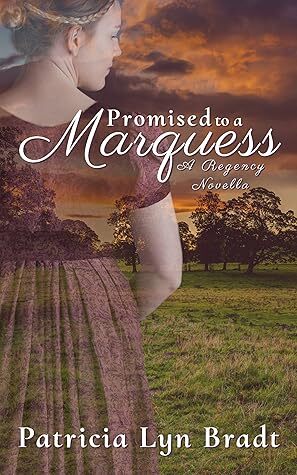 This is the first of a series of novellas, but they’re so interconnected, with the same set of characters running throughout, that I’m going to review the series as a whole. Suffice to say that I practically inhaled these over a long weekend of travelling – they are near-perfect bite-sized Regencies. Here are the five books:
This is the first of a series of novellas, but they’re so interconnected, with the same set of characters running throughout, that I’m going to review the series as a whole. Suffice to say that I practically inhaled these over a long weekend of travelling – they are near-perfect bite-sized Regencies. Here are the five books:Book 1: Promised to a Marquess: He may have found his perfect match. If only she weren’t promised to his best friend.
Book 2: A Widow for the Marquess: She has no desire for another husband. He is hiding from his responsibility to find a wife. What will it take to change each other’s minds?
Book 3: The Pretended Debutante: He believes her shallow. She finds him staid. What if they are both wrong?
Book 4: A Betrothal of Convenience: The betrothal is pretend. But what of their feelings?
Book 5: The Rules of a Gentleman: She’s known him her entire life. But how well does she really know him?
A novella is an interesting length for a book. It’s long enough for some proper character development, but also short enough that the reader doesn’t get bogged down in vast arrays of characters and subplots. It’s all quite straightforward – a falling-in-love (or realising-in-love) build-up, a major obstacle of some kind, and then the resolution and romantic denouement. The romances were all lovely, and although the obstacles were not all totally convincing, I could go with the flow to get to those wonderful, emotional endings. The side characters were (mostly) delightful people, and very helpful to our struggling couples. There was a villain or two, suitably villainous, and although I prefer a bit more nuance in both good and bad characters, in a story of this length, there’s not a lot of room for subtlety. And for those who like epilogues, you’re in luck here.
I thoroughly enjoyed all five stories, so why only four stars, not five? I’m sorry to say the sheer weight of Americanisms wore me down in the end. Sidewalk, go do something, write someone, fall, visit with, passed… there were so many of them. And silly typos, too, like manor instead of manner, rain instead of rein, and so on. The Americanisms might be intentional, perhaps, because some authors do prefer to aim for an American audience, but a final proofread should have caught the typos. Such a shame, because it’s clear that the author has done a lot of research on the Regency, and the books are well-written otherwise, and sex-free. I recommend them to anyone who doesn’t mind these things as much as I do. Four stars.
Review: Wife Errant by Joan Smith (1992)
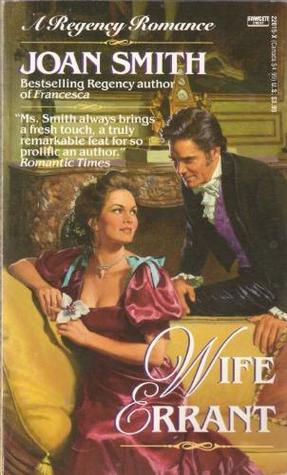 This is such a hot mess of a book. Joan Smith is always a bit hit or miss, but this one was a spectacular miss, without a single likeable character or plot event.
This is such a hot mess of a book. Joan Smith is always a bit hit or miss, but this one was a spectacular miss, without a single likeable character or plot event.
Here’s the premise: Tess Merchant’s parents are living apart and threatening to divorce, largely because he’s been fooling around with a mistress very publicly, and she retaliates by finding an admirer or her own. Tess can see that this is not going to end well. However, the admirer, Lord James, has a cousin who’s almost as much of a ne’er-do-well as he is, but Tess wonders whether Lord Revel might have some influence over his cousin and get him to back off. Then at least there’d be a chance of persuading her father back home, which the whole family wants.
Now, this is a fairly daft plot to begin with. Divorce isn’t something anyone undertakes lightly, for one thing, since it involves an act of Parliament, and no wife could get one in the Regency. It was strictly for men to get rid of adulterous wives, not for wives to get rid of adulterous husbands. There was no recourse for them except to put up and shut up. Still, Lord Revel agrees to be party to the scheme to reconcile the parents, mainly by encouraging Tess to step outside the bounds of propriety and stay out till all hours with him. Right, so the plan is to restore the family’s reputation by damaging the daughter’s… I see. And, in the best traditions of Joan Smith novels, the two manage to fall in love while constantly sniping at each other and pretending they hate each other.
There’s a lot more silliness, but I really can’t be bothered to go into all that. I finished the book without throwing it against the wall, that’s as much as I can say about it. And it’s clean. And it’s Joan Smith, so if you like that kind of undiluted sniping for almost the entire book, there you go. Two stars (and I think I’m being generous here).
Review: Christmas Belle by Mary Balogh (1994)
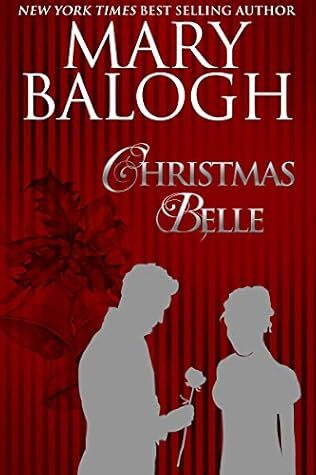 A much better read than the first book in the series (The First Snowdrop, to which I gave three stars – for a Mary Balogh book!). This one has a vastly improved hero, and two possible brides for him, both trying to do their best in difficult circumstances.
A much better read than the first book in the series (The First Snowdrop, to which I gave three stars – for a Mary Balogh book!). This one has a vastly improved hero, and two possible brides for him, both trying to do their best in difficult circumstances.
Here’s the premise: Jack Frazer has been invited to spend Christmas with his ducal grandparents, along with their vast family, a lot of organised events he’ll be required to participate in, and his future bride. At least, a young lady has been invited, and Jack will be expected to court her and, if they like each other, to propose. He’s not much minded for marriage, having enjoyed his freedom very much, thank you, but he finds himself obeying the summons and meeting the young lady, only to discover that, while she’s very pretty, she’s also very young, a petite, doll-like creature who looks as if she’s straight out of the schoolroom.
Meanwhile, the main entertainment of the festivities is to be provided by a renowned actress, Isabella, the Comtesse de Vacheron, who will perform several extracts from Shakespeare, with the aid of a supporting cast provided by the family. She’s a widow with two children, and remarkably respectable for an actress, having been feted in both France and Britain. There’s only one problem – she was Jack’s mistress for a year nine years ago, a relationship that ended in anger and bitterness. Neither is happy to find the other at the party, but they agree quite early on to leave the past where it belongs and avoid each other as much as possible.
The reader knows, of course, how well that’s going to work out. What makes this whole setup so interesting is that Jack’s potential bride, Juliana Beckford, is also given equal billing with the two principals, so we see her thoughts and feelings as well as Jack’s and Bella’s. I liked Juliana very much. Some reviewers called her spineless, but I think she’s a perfect Regency lady, well brought up, if very innocent and unversed in the ways of the world, and she puts her duty and obedience to her parents above her own wishes. They have arranged a very prestigious marriage for her to the grandson of a duke, a man of independent wealth, and even though she worries about him being so much older and more experienced than her, and she isn’t in love with him, she sets out to do what she feels is the right thing.
Jack, too, is determined to do the right thing. He accepts at an early stage that he’s going to offer for her, and sets himself to court her conscientiously, taking things slowly because he realises she’s very innocent. And if he has reservations about her youth and his lack of physical desire for her, he tells himself that will grow, and that he can make her happy. He’s being honourable and mature and not trying to recapture his youth with Bella, and that makes him a proper hero in my book.
Bella I’m less sure of. I’m not much enamoured of heroines who are so driven to succeed in their chosen profession that they essentially sabotage every other part of their lives. But I suppose she was young and naive and caught in a difficult situation when she was Jack’s mistress, and as a mother she can’t be faulted. She puts her children first, always, and I can only applaud that. The children, actually, are a real highlight of the book. They’re not merely ciphers or plot devices or there to be winsomely cute or wilfully awful. Things do get a bit schmaltzy towards the end, but Balogh keeps it just on the right side.
I do dislike the obvious double standard. One of the reasons Jack and Bella fell out was because he was convinced she was sleeping with other men, despite her denials. When he finally realises the truth, there’s an air of: oh, that’s all right then, she’s not a slut after all. Whereas he consoled himself after their parting by sleeping with every woman he could get his hands on. But somehow nothing is ever said about that.
What else grated? The vast assortment of relations, and since most of them are happily paired off with young children, it’s difficult not to believe that there’s a whole series somewhere that told the stories of them all. As it was, the only ones I knew were the awful hero from The First Snowdrop and his wife, and I remembered Freddie (‘I’ve got no brains’) from that book, too, because really, could Balogh not have given him some variation? The whole acting thing was pretty tedious, and apart from the plot device of getting a famous actress to the house, there was no point to it. There was no moment of revelation when Jack and Bella acted together, and all the lurches forwards and back in their relationship happened for other reasons. I’m not a big fan of a Christmas setting with snowball fights and decorating the rooms and the inevitable kissing bough. And did they really have an evening church service in the Regency? And please, please, please can we banish the obligatory skating on the lake scene, followed by the mind-numbingly predictable falling through the ice scene. It’s been done. It’s old.
But despite my grumbles, I really loved this book – mostly! I can’t quite give it five stars, but Balogh did her usual trick of making me cry several times, so let’s call it a very good four stars. Warning: it’s Balogh so there are sex scenes.
October 6, 2024
Review: Lace For Milady by Joan Smith (1980)
 I don’t know why, but I felt like I’d read this book before. The grumpy heroine, the eccentric lord who courts her (sort of), the even more eccentric companion and the smuggling subplot – it all felt a bit familiar. But the tetchy arguments between hero and heroine (I won’t flatter them by calling them banter) and the not-quite-sure-what-he’s-up-to hero are classic Joan Smith, and it was all very enjoyable.
I don’t know why, but I felt like I’d read this book before. The grumpy heroine, the eccentric lord who courts her (sort of), the even more eccentric companion and the smuggling subplot – it all felt a bit familiar. But the tetchy arguments between hero and heroine (I won’t flatter them by calling them banter) and the not-quite-sure-what-he’s-up-to hero are classic Joan Smith, and it was all very enjoyable.Here’s the premise: Miss Priscilla Denver, after a fairly impecunious childhood, has finally come into a sizeable inheritance, so she decides to uproot herself and move nearer to her only surviving relation, an aunt living on the south coast. She buys a neglected dower house from the aunt, and settles there contentedly with her middle-aged spinster companion, Miss Slack. But then her neighbour, the Duke of Clavering, turns up and it appears that he owns the land on which the dower house is built, and the leasehold only has a few more years to run. But not to worry, he’ll buy back the house at whatever Priscilla paid for it, or maybe even more, so she’ll be able to buy another house and everyone will be happy, won’t they?
Except Priscilla, of course, who quite likes this house, thank you very much, and she’s deeply suspicious of the duke’s motives for buying it from her. First he says he wants it for an elderly relative, then it’s to be a museum, since there’s a Roman fort underneath it. There are also some Roman remains in the middle of a field, which the duke is protecting by deploying mantraps around it, which Priscilla deplores. There are some strange noises emanating from the fireplace in the house, which the duke fails to satisfactorily explain. Is it ghosts? Or smugglers? Or simply someone banging about in the cellar? Priscilla is determined to get to the bottom of the mystery, and the duke is equally determined to get her out of the house.
It’s an odd thing, but looking back on this, none of the various components worked particularly well. The heroine is, frankly, a termagant, often driven to do something just because she’s told she shouldn’t. The hero is almost as grumpy as she is, and as devious and slippery as an eel. It’s hard to believe a word he says. The romance consists of the two of them quarrelling (I don’t think there’s another word for it, and it certainly isn’t flirting). The hero pays more attention to the middle-aged companion than he does to the heroine, and we don’t see the slightest hint of affection in him until she is injured (doing something she’s been told not to do). The proposal is the same kind of quarrelling, only lightly modified.
And yet, somehow it all works. It’s not my favourite type of Regency (I like my hero and heroine to show some actual sign of emotion rather than well-I-suppose-I’ll-have-to-marry-you nonsense), but Joan Smith is such a stellar writer, and there are so many laugh-out-loud moments that I can see I’ll have to give it four stars.
Review: The Sprinter by Kate Archer (2022)
 Well, here’s a thing – a Kate Archer book that failed to make the 5* grade. What went wrong? Well, technically nothing. The book’s as entertaining as the previous ones, but somehow it felt very samey. The country girl brought up to London to be launched into society by a high-ranking lady with no daughter of her own, the business of planning gowns and public appearances, the (male) relation of said high-ranking lady who is immediately drawn to the country girl, the balls and misunderstandings and comic servants and so on. There are differences, but there’s a strong air of deja vu about it.
Well, here’s a thing – a Kate Archer book that failed to make the 5* grade. What went wrong? Well, technically nothing. The book’s as entertaining as the previous ones, but somehow it felt very samey. The country girl brought up to London to be launched into society by a high-ranking lady with no daughter of her own, the business of planning gowns and public appearances, the (male) relation of said high-ranking lady who is immediately drawn to the country girl, the balls and misunderstandings and comic servants and so on. There are differences, but there’s a strong air of deja vu about it.Here’s the premise: Lady Heathway is one of six ladies who have no daughter of their own, so decide to help a girl into society who would otherwise not have a season. Lady Heathway’s chosen girl is Grace Yardley, daughter of a deceased viscount, who has been banished to the dower house with her drooping mother by the new viscount. With very little money to live on (I wonder why? Where is the widow’s jointure?) and the dower house practically falling down around their ears, her mother takes to her bed and Grace struggles to manage with just a couple of servants. Into this dispiriting setup arrives the letter from Lady Heathway inviting Grace to London. She can’t possibly leave her mother, so she declines and that appears to be that.
Lady Heathway, however, is not a lady who allows that to be that. She turns up at the dower house, tame nephew, Lord Gresham, in tow, and summarily disposes of all objections. Grace’s mother is to have the full time care of a nurse to tend to her needs for whatever ails her, and a top physician from London will be dispatched to oversee the case. Grace is to pack and leave for London immediately. And so it happens.
Grace is quite happy to have the pleasure of a season, and soon finds that Lady Heathway has been planning this for a long time, even to the precise dress designs. She still worries about her mother, but she’s enjoying herself, and especially the company of handsome Lord Gresham, who seems to be spending a lot of time calling at the house. But the letters from her mother are deeply concerning – the doctor and nurse are overbearing, and force her out of doors and to eat things she’d rather not eat, and have they no sympathy for a poor invalid at all? But when Lady Heathway dismisses these concerns out of hand, Grace determines to make a bolt for the country to see her mother, and climbs out of her bedroom window to do so.
Needless to say, everything that could go wrong, does, and Grace acquires a reputation as a sprinter (hence the book’s title). From here the book spirals into a tangled web of plot complications, with Lord Gresham determined to keep all other suitors away from Grace so that he can marry her himself, while she thinks she has no chance with him, and determines to accept the first offer she gets, in order to get her sick mother out of the leaky dower house as soon as possible. And meanwhile, the villain of the piece is determined to throw a spoke in everyone’s wheels and get his revenge.
Needless to say, it all works out satisfactorily in the end, with all misunderstandings cleared up, and I did enjoy it, but perhaps I’ve just read too many of Archer’s books back to back because it didn’t resonate with me the way the previous ones did. But the humour is still there in spades, and I’m hopeful that the next book will be a little bit different, to restore the freshness. The writing is a pleasure to read, as always, although I wondered a little at White’s having a pool room (could this be billiards, perhaps?). Four stars.
Review: A Masked Deception by Mary Balogh (1985)
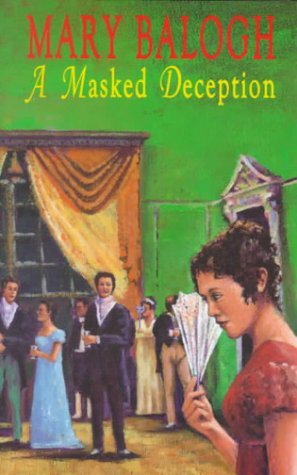 One of the things I most admire about Mary Balogh is her ability to look unflinchingly at her characters and their behaviour. This is one of those cases where I rather wish she had flinched, and given the hero at least one or two redeeming features. This was her first published work, so perhaps one should make allowances, but it’s difficult. This is a fairly ranty review so it’s quite spoilerish. Don’t read unless you want to know most of the plot.
One of the things I most admire about Mary Balogh is her ability to look unflinchingly at her characters and their behaviour. This is one of those cases where I rather wish she had flinched, and given the hero at least one or two redeeming features. This was her first published work, so perhaps one should make allowances, but it’s difficult. This is a fairly ranty review so it’s quite spoilerish. Don’t read unless you want to know most of the plot.
Here’s the premise: Six years ago, Richard, the Earl of Brampton, had met a passionate but regrettably anonymous stranger at a masked ball. She disappeared before the unmasking, and he was never able to find her again, although he’s never forgotten her. Now, with his mother agitating for him to marry and sire the essential heir, he settles on mousy Margaret Wells, who will give him no trouble, and can be safely left in the country raising the heir while he maintains his mistress in London. What he doesn’t know is that Margaret is the very same passionate stranger he remembers so vividly. He also doesn’t know that she fell instantly in love with him six years ago. So the scene is set for a gradual rediscovery of that passionate interlude.
Except that’s not what happens. Richard decides that he can’t inflict passion on his mousy wife, so sex is a brief, perfunctory affair, and she is too mouse-like to complain. And naturally, she can’t possibly tell him that she was the stranger from six years ago. Wait… why ever not? Well, because the plot requires her to keep quiet about it, that’s why. And so she does, but she’s a bit sad, because she enjoyed all that sexy kissing and fumbling under clothes from six years ago and she’d like a bit of that now, thank you very much. But when younger sister Charlotte arrives for her come out and asks why she’s a bit sad, Margaret tells her the whole story, and Charlotte has the brilliant idea that Meg should dress up in her mask costume again and see if she can entice Richard into a bit of that sexy stuff. And so she does, arranging to just happen to bump into him at Vauxhall’s, and would you believe it, he not only falls for his mysterious stranger all over again and gets hot and heavy with her, but he doesn’t even recognise his own wife?
Well, no, I wouldn’t believe it, actually. They even begin a torrid affair in his best mate’s bed, and even though he sees the similarities with his wife, he doesn’t once twig that it’s actually her. Yet the best mate, who doesn’t know her half as well, recognised her instantly. How ridiculous is that?
The other major stumbling block to credibility is Margaret herself. We’re supposed to believe that her public persona is very calm and reserved, almost cold in its lack of emotion. Nothing, it seems, dents her composure. But somehow, put her in a Marie Antoinette costume, a wig and a mask, and she becomes an unrestrained nymphomaniac. I would have found this more credible if we’d been shown any sign of this inner tempestuousness, but there’s nothing at all, not a flash of anger or a sharp word or the slightest hint of a flounce. She doesn’t even speak up for herself, simply accepting whatever neglect or implied insult her husband heaps on her head.
The question of Richard’s morality is more ambiguous. Nowadays, a hero who maintains his mistress after he’s married and then has an unrestrained affair with a woman whose name he doesn’t even know is a bit of a non-starter for a romantic novel, but when this book was written, almost forty years ago, heroes of this type were par for the course. And he does very gradually come to appreciate his wife. He dispenses with the mistress and he even gives up his affair with the mystery lady because he tells himself he’s in love with his wife.
Meanwhile there are a couple of side romances going on, for Charlotte and also for Richard’s brother Charles. This may be an opportune moment to point out that there a great many perfectly respectable names for Regency characters, so it would be nice if authors would refrain from using two such similar ones as Charles and Charlotte. Anyway, the side romances aren’t wonderful, but in the end they’re better than the main event, which blows up in spectacular fashion.
Richard, you see, discovers the Marie Antoinette costume in his wife’s wardrobe and the slow-top finally realises that she was the mystery lady all along. Whereupon he goes into a towering rage at being made to look a fool, because it’s all about him, you see. He was the one who chose to have a torrid affair with a woman he believed was not his wife, but it’s her fault for being a slut and enticing him (or something). She tries to explain but he doesn’t want to listen, and then he crosses an inviolable line, in my view, by using violence against the heroine, his own wife. Even when she tells him not to hurt her too badly because she’s pregnant, it doesn’t calm him down because he doesn’t believe her! Only when she finally blows her top and points out what a hypocrite he is does he realise that maybe she has a point. Then he cries, tells her he loves her and they go to bed and have passionate sex, and I can’t tell you how much I despise him at this point. I don’t have much respect for her, either, but he is far, far worse. I don’t think he even knows the meaning of the word love.
This was heading for three stars, because on the whole the thing is readable and even enjoyable for much of it, and even though I wanted to slap both hero and heroine upside the head, I make allowances for the age it was written in, and it was Balogh’s first book, after all. My own first Regency was pretty terrible, too. But that ending made me so mad, I knocked it down to two stars. So there. Recommended only for completists, and definitely not for anyone looking for a clean read – there’s an awful lot of sex in it. Or a lot of awful sex for Margaret, poor girl.
The theme of this book, the Regency marriage of convenience and what it would be like in reality without the romance author’s typical sprinkling of magical stardust, is one that interests me greatly. Balogh has tackled the idea in two other books (that I know of; there may be others). Dancing With Clara (1993) suffers a little from a depressing ending, in my opinion, but in The Obedient Bride (1989) she gets it absolutely right, and with a proper hero. I highly recommend it as an antidote to the insufferable Richard.



